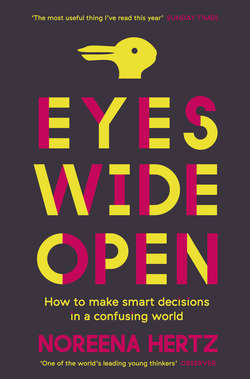Читать книгу Eyes Wide Open: How to Make Smart Decisions in a Confusing World - Noreena Hertz - Страница 43
From Monkeys to Garbage Collectors
ОглавлениеBut experts do get things wrong. A lot wrong. I’m not talking here about tricksters like Dr Fox. Or fraudsters such as Hwang Woo Suk, the South Korean stem-cell researcher who claimed to have created the world’s first cloned human embryos, but hadn’t. Or the 2 per cent of scientists who admit to cheating outright – falsifying or fabricating their results.5 I’m talking about your run-of-the-mill expert and run-of-the-mill error.
Did you know that studies have shown that doctors misdiagnose one time in six?6 That of the one in twelve patients who die in hospital because of misdiagnosed ailments, half would have survived had the diagnosis been correct?7 Or that 50,000 hospital deaths each year in the US and Canada could have been prevented if the real cause of illness had been correctly identified?8
Did you know that you are more likely to file your tax returns correctly if you do it yourself than if you hire a tax adviser to do it for you?9 That 70 per cent of mutual-fund managers underperform the market?10 Or that in Germany up to 80 per cent of all long-term financial investments are terminated prematurely because of the unsuitable advice consumers have been given by their supposedly expert investment advisers (unsuitable advice which is estimated to cost German consumers twenty to thirty billion euros every year)?11 And how about the Cranfield Study of companies that had used management consultants? Two-thirds considered the advice they’d been given to be at best useless, at worst actively harmful.12
Then there are the forecasts of economic or political experts.
In 1984 The Economist set a challenge to four different groups to predict what the world economy would look like in ten years’ time. The groups were comprised of four former finance ministers, four chairmen of multinational companies, four Oxford University students, and four London dustmen. Each group was set the same questions relating to inflation, economic growth and the pound–dollar exchange rate. They were also asked to predict when Singapore’s GDP per head would overtake Australia’s.
Ten years later, the magazine reviewed the predictions to see which group had made the most accurate forecasts. Four points were given for the most accurate answer to each question, three for the second best, two for the third best, and one for the worst.
Who got the highest score?
The dustmen. As for the finance ministers – they came last.13 No wonder the global economy is in the state it’s in.
When it comes to crystal-ball gazing, experts frequently get it wrong.
Some of the biggest moments in the past fifty years – the 1973 oil crisis,14 the fall of the Soviet Union, 9/11, and most recently the Arab Spring – were missed by traditional intelligence experts, whilst a study of 82,000 predictions by 284 experts over a sixteen-year period, on issues ranging from the future of the then USSR to Saddam Hussein’s invasion of Kuwait, revealed that the experts got no more right than a monkey randomly sticking a pin on a board. ‘It made virtually no difference whether participants had doctorates, whether they were economists, political scientists, journalists or historians, whether they had policy experience or access to classified information, or whether they had logged many or few years of experience,’ wrote the author of the study.15
It’s not just metaphorical monkeys who outdo experts, however. The Observer’s 2012 Investment Challenge pitted a team of professional investment advisers against Orlando, a flesh-and-blood ginger tomcat. Each began with a notional £5,000 to invest in five companies from the FTSE All-Share Index. Every three months they were allowed to exchange any stocks with others from the index.
While the professionals used their expert knowledge and decades of investment experience to guide their decisions, Orlando selected his stocks by throwing a toy mouse on a grid of numbers, each representing a different company.
At the end of the year, the professionals’ portfolio was worth £5,176.60 – a 3.5 per cent return on their investment. And how did Orlando do? He ended up with £5,542.60, a return of almost 11 per cent.
As Justin Urquhart-Stewart, one of the expert wealth managers, good-humouredly said, ‘It’s time to crack open the Whiskas. The cat’s got talent.’16
Still got experts on that pedestal?
